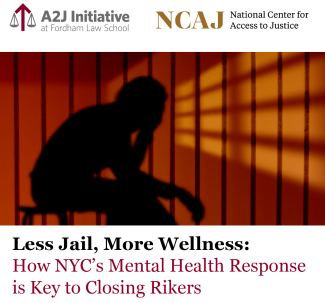
New York City committed to closing the infamous Rikers Island by 2027. Today, however, the number of people in New York City jails is climbing, more than half of those incarcerated have a mental health diagnosis, and one in five has a serious mental illness. The jail is the largest mental health provider in the City and among the largest in the world, and the burdens of this dysfunctional system fall most heavily on Black and brown communities. The state of affairs is inhumane to those incarcerated, an obstacle to the City’s promise of closing Rikers, and a threat to the safety of people living with mental illness and New York more generally. Please join Lauren Jones, NCAJ's Legal and Policy Director, in this discussion with Manhattan DA Alvin Bragg, Mental Health Court Judge Matthew D'Emic, Bronx Defenders' Deputy Executive Director Wesley Caines, and Fountain House Chief Strategic Growth Officer Dr. Ayesha Delany-Brumsey as we consider Less Jail, More Wellness: How NYC's Mental Health Response is Key to Closing Rikers.
Register here and join us from 6:30 to 8 pm on September 13th in Fordham Law School's Costantino Room, 150 West 62nd street, 2nd Floor (or, view online, link provided following registration).
Learn more about the National Center for Access to Justice and about our event cosponsors: